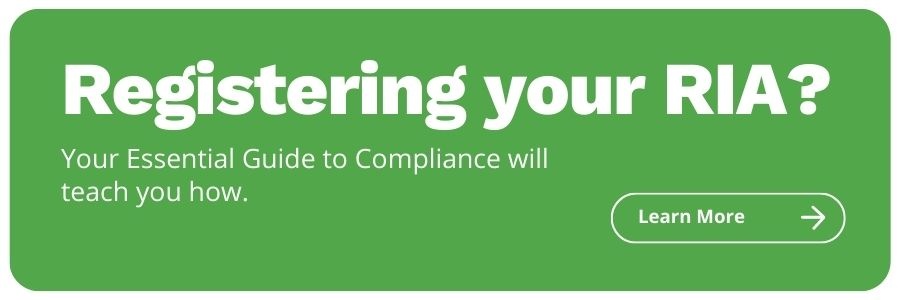Making Changes to your Compliance Program for the DOL Ruling
Share this
The Department of Labor (DOL) has determined via Final Rule, that persons who provide investment advice or recommendations for a fee or other compensation with respect to assets of a plan or IRA are to be viewed as fiduciaries in a wider array of advice relationships. In light of the importance of the Final Rule’s consumer protections and the significance of the continuing monetary harm to retirement investors without the rule’s changes, an original applicability date of April 10, 2017 was established as the effective date of the ruling. This applicability date was later delayed to June 9th, 2017, and to date, there has been no further extensions.
By now most advisory firms are aware of the recent Department of Labor Fiduciary Rule. It has been brewing for a while, but the applicability date of the rule is finally here (as of June 9, 2017). For those who may not be familiar with the basis of the ruling, a brief description is that clients who are benefiting from protections under ERISA (historically for Defined Benefit Plans), should not lose those protections as a result of a rollover from a qualified plan account into an IRA at the recommendation of a financial adviser. The main aspect of ERISA, that traditionally has not applied to all investment adviser representatives, is fiduciary responsibility. This is no longer the case. In layman’s terms, advisors who recommend IRA rollovers, and/or who manage IRA assets, now have greater compliance responsibilities.
Most of the meetings that created regulatory guidelines for the ruling were conducted by the DOL (a federal regulator), with input from national lobbying organizations, and fellow federal regulators like the SEC. This creates a unique challenge for state-registered investment advisory firms. At this point, most state-registered firms are yet to hear anything specific about this from their individual state regulators. So, whether there will be any additional requirements for state-registered firms, or the timeline for implementation and audit/examination specifics at the state level, are all unknowns, beyond what the DOL fiduciary rule requires directly.
While the implications of this ruling may differ based on a firm’s current business practices and services offered, there are a few basic ideas that are consistent. With that, here are a few things firms can do to effectively move forward in light of this ruling.
1. Best Interest Contract Exemption - The Best Interest Contract Exemption (BIC Exemption) requires the Advisory Firm to acknowledge fiduciary status for itself and its advisers. It also requires that the firm and its advisers adhere to basic standards of impartial conduct. In particular, under this standards-based approach, the firm and its advisers must acknowledge their commitment to giving prudent advice that is in the customer’s best interest, to avoid misleading statements, and to receive no more than reasonable compensation.
To take action, firms must adopt statements of fiduciary status to distribute to clients, and should have client acknowledgements signed, attesting to their receipt of this documentation (though it may be included as part of an advisory or brokerage agreement).
2. “Level-Fee Fiduciary” is set to become a big deal! According to the National Law Review, “A Financial Institution and Adviser are ‘‘Level Fee Fiduciaries’’ if the only fee received by the Financial Institution, the Adviser and any Affiliate in connection with advisory or investment management services to the Plan or IRA assets is a Level Fee that is disclosed in advance to the Retirement Investor. A ‘‘Level Fee’’ is a fee or compensation that is provided on the basis of a fixed percentage of the value of the assets or a set fee that does not vary with the particular investment recommended, rather than a commission or other transaction-based fee.” By operating as a level-fee fiduciary, an adviser qualifies for streamlined exemptions within the DOL Fiduciary Rules, though the advisor must still acknowledge fiduciary status in writing, and adhere to the Impartial Conduct Standards. Most (but not necessarily all) fee-only firms, and RIAs in general, will qualify as level fee fiduciaries.
To take action, firms should review their compensation arrangements with clients to clarify whether they do (or do not) qualify as level fee fiduciaries. Any receipt of commissions for retirement assets, regardless of whether operating as an RIA, broker-dealer, or insurance agent, will not satisfy the level fee fiduciary requirement, nor will having uneven advisory fees for different types of investment solutions.
3. Brokers will have to adapt to what their broker-dealers choose. Most RIAs will qualify as level fee fiduciaries, but most broker-dealers will not, as their multiple levels of compensation structure, including brokerage commissions, insurance commissions and annuity trails, and advisory revenue, do not meet the level fee fiduciary requirements. This will require most broker-dealers to meet the requirements of the full BIC exemption, which includes substantial additional oversight policies and procedures, and further disclosures. Because the client technically signs their agreement with the broker-dealer, for which the “advisor” acts as a registered representative of the firm, advisors working under a Broker-Dealer will need to watch for and adhere to whatever changes the broker-dealer requires.
To take action, advisers at broker-dealers can speak with their compliance officer at their brokerage firms and wirehouses, to create a strategy that works for the structure of their book of business.
4. Supervision and Review - For many firms, particularly in the fee-only financial planning space, there may not be a high volume of 401(k) to IRA rollover recommendations, in which the advisor also manages the IRA and charges a fee for the management of those assets. For others, this may be a common business practice. In either case, compliance officers should evaluate the level of risk that they anticipate this ruling will pose for their firm’s compliance programs, and adjust supervision and review practices accordingly. If a compliance officer anticipates that this ruling will pose a high level of risk for their firm, they may wish to update their compliance manual to reflect a monthly review of actions that would trigger adherence to the ruling. For firms that rarely execute such recommendations as part of their business model, the review may be conducted quarterly, or even annually. In each case, controls should be in place to allow for adequate sampling and testing of recommendations in response to this ruling. At a minimum, advisors of all types should be cognizant that a core requirement of the Best Interests Contract, including the streamlined level fee fiduciary rules, is that there should be clear documentation by the advisor regarding any recommendation to invest in or roll over to an IRA.
To take action, firms should ensure that they have an advisor CRM or comparable platform to capture documentation of all retirement recommendations made to clients, and can consider adding a few items in their compliance manual or written supervisory procedures that outline the methods by which sampling and testing will occur for rollover recommendations, and the corresponding frequency. Then, implement accordingly, and document reviews thoroughly.
With new rulings and regulations come uncertainty. In order to overcome the anxiety that is often associated with this uncertainty, firms are advised comprehend and interpret the rationale behind the ruling, for the purpose of implementing a reasonable and sound set of policies and procedures. As always, when in doubt, compliance officers should reach out to their regulatory agency for guidance.
Share this
- Advisor Blog (690)
- Financial Advisors (219)
- Growing an RIA (99)
- Digital Marketing (86)
- Marketing (83)
- Community (81)
- Start an RIA (75)
- Coaching (72)
- Business Development (70)
- Running an RIA (70)
- Compliance (69)
- Client Acquisition (65)
- Technology (64)
- XYPN LIVE (59)
- Entrepreneurship (56)
- Sales (48)
- Practice Management (44)
- Client Engagement (41)
- XYPN Books (38)
- Bookkeeping (37)
- Investment Management (37)
- Fee-only advisor (34)
- Lifestyle, Family, & Personal Finance (31)
- Employee Engagement (30)
- Client Services (25)
- Financial Education & Resources (24)
- Market Trends (21)
- Journey Makers (20)
- Process (14)
- Niche (11)
- SEO (9)
- Scaling an RIA (8)
- Career Change (7)
- Partnership (6)
- Transitioning Your Business (6)
- Transitioning To Fee-Only (4)
- Social Media (3)
- Transitioning Clients (3)
- Emerald (2)
- Persona (2)
- RIA (2)
- Onboarding (1)
- Sapphire (1)
Subscribe by email
You May Also Like
These Related Stories

Corporate Transparency Act: What State-Registered Investment Advisors Need To Know
Dec 11, 2023
3 min read

Adjusting Your Compliance Program for a TAMP
Mar 8, 2018
5 min read





